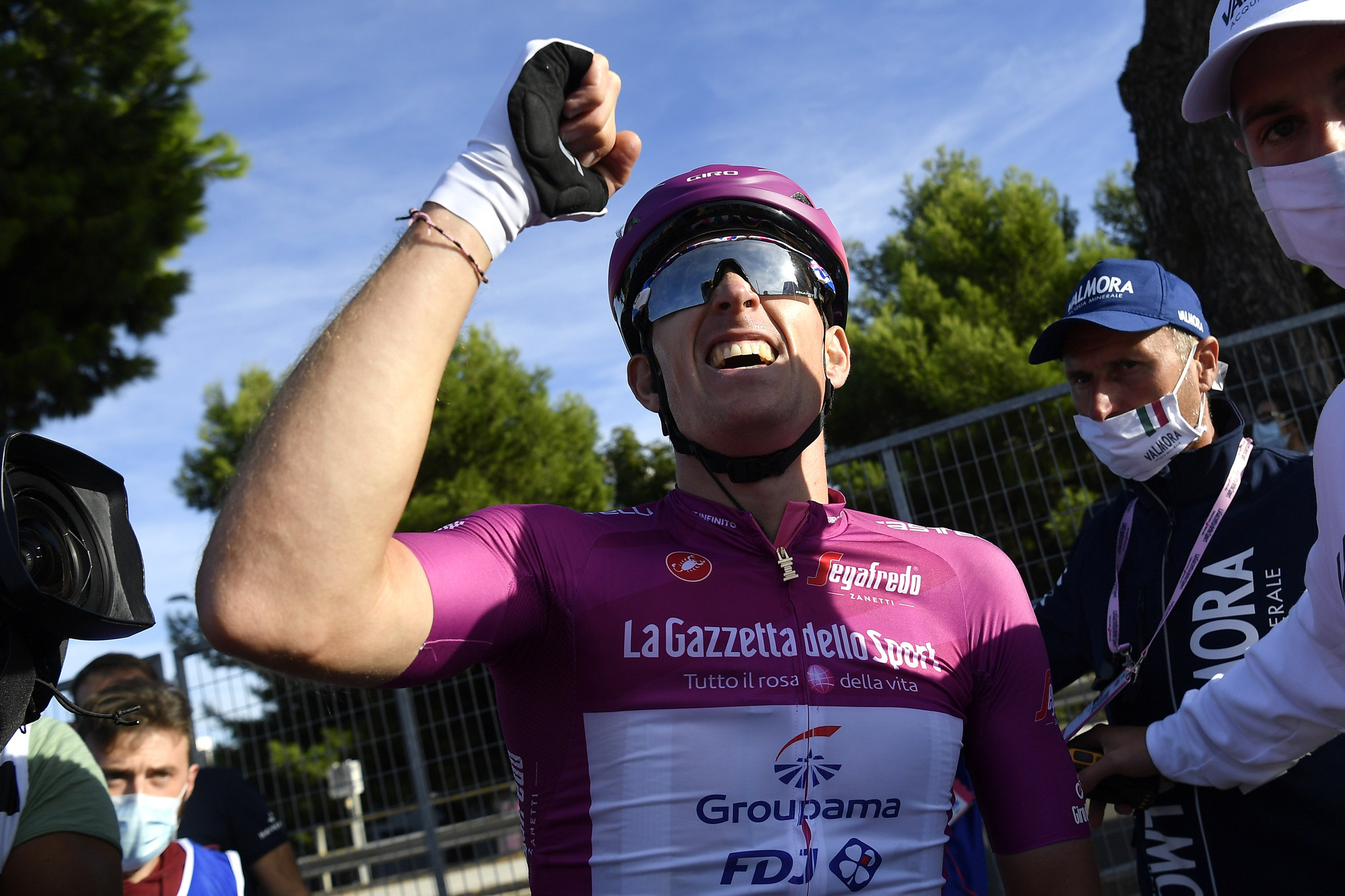Giro d'Italia: Démare speculates Peter Sagan is slower because of Classics focus
French champion says cancellation of Paris-Roubaix is 'sad for cycling and history of cycling'

Three-time 2020 Giro d’Italia stage winner Arnaud Démare (Groupama-FDJ) has argued that one of his key rivals, Peter Sagan (Bora-Hansgrohe) may have lost some of his high-end speed because of a focus on the Classics.
Sagan has now finished in second place three times at this year’s Giro d'Italia, beginning on stage 2 at Agrigento on an uphill finish, then on stage 4 at Villafranca Tirrena and again on stage 7 in Brindisi.
Démare, meanwhile, continued to dominate the 2020 Giro sprints, with Friday his third victory in four days.
Asked why he thought Sagan could not get the better of him in the Italian Grand Tour, at least for now, the French national champion pointed to the Slovakian’s focus on the Classics as a possible reason.
“He’s maybe lost some explosivity and speed because he chose to do that,” Démare speculated, “Perhaps it’s the same mistake I made one or two years ago, but then I refocussed this year fully on my sprinting and that’s worked for me."
Démare’s strategy certainly has paid off in the Giro d’Italia, as on Friday he became the first rider in a decade to take three stages in the first nine-day "week" of the race.
Riders who have all taken two wins in the same period, prior to the first rest day, have been Pascal Ackerman (2019), Elia Viviani (2018), Fernando Gaviria (2017), Marcel Kittel (2016, 2014), Andrei Greipel (2016), Diego Ulissi (2014) and Mark Cavendish (2013, 2012).
Get The Leadout Newsletter
The latest race content, interviews, features, reviews and expert buying guides, direct to your inbox!
Démare has now gone one better than all of them, and on Saturday, he may even add another win to his collection before the Monday rest day.
Rather than accrediting his successes to his own strengths, Démare paid tribute to his teammates' contribution on his stage 7 win, saying that collective strength rather than an individual sprint effort had been pivotal to his latest success.
“Jacopo [Guarnieri] sorted things out when UAE tried to get past us, and although [Ramon] Sinkeldam had a mechanical in the last kilometre and we had to change tactics in the last 200 metres, [Miles] Scotson took over his role perfectly. Then Kono’ [Ignatus Konovalovas] had the strength to help me in the last kilometre, even though he’d done a lot of work in the build-up," Démare confirmed to reporters about Friday being a very different sprint.
“On top of that it was a real, hard sprint, elbow-to-elbow all the way to the line and we had those crashes and echelons earlier on. It was a big day all round.”
Démare was so determined to show that his team had played such an important role that he even interrupted the race translator to add in a few more comments about how well he felt he was supported at Groupama-FDJ.
“Simon Guiglielmi is doing his first year as a racer, and he’s doing an amazing job. But I also have a lot of really experienced riders as well at my side. Jacopo, Ramon, Kono’, guys I’ve been with for three or four years now, they’ve all got good heads on their shoulders. They know it’s difficult to win sprints, but they know how to keep pushing whatever. And our best quality is we’re humble, we don’t take anything for granted.”
The sprint itself was not totally exempt of controversy, given Démare also shifted his line slightly in the final dash for the line, "closing the door" a little on Sagan as the Slovak came up on his right.
But no appeals were lodged with the commissaires, nor was there a penalty on grounds of a dangerous manouevre, as had been the case for Sagan in a stage of the Tour de France this summer.
Cancelled Paris-Roubaix
Earlier in the day, Démare was the focus of questions about the cancellation of the ‘Queen of the Classics', due to his track record in Paris-Roubaix, where he has taken sixth and 12th in the past.
“It’s very sad for cycling and for the history of cycling. I think it’s the first time since the Second World War that the race has been cancelled. It’s a strange year.
"In cycling, we’ve come out of it well by being able to do so many races, but this is a step backwards,” Démare said, before adding that he hoped he could win it one day.
For now, in any case, Démare remained fully focussed on the Giro d’Italia sprints, where he said the security gained by his previous victories had created a kind of domino effect, making it easier for them to win more easily as the Giro progressed and any tendency to over-react to challenges was lessening.
Citing Friday’s sprint as an example, the Frenchman said, “Once a QuickStep rider opened up the sprint, I let him go a little, and waited for the right moment to accelerate. And yesterday [stage 6] when I was feeling tired after the climb just before the final sprint, I gave myself time to recover. The good thing is, having won one sprint, we can risk more now.”
But no matter which path Démare takes to victory, and no matter how much he and his team gamble, the result, this week at least, has ended being exactly the same.
Alasdair Fotheringham has been reporting on cycling since 1991. He has covered every Tour de France since 1992 bar one, as well as numerous other bike races of all shapes and sizes, ranging from the Olympic Games in 2008 to the now sadly defunct Subida a Urkiola hill climb in Spain. As well as working for Cyclingnews, he has also written for The Independent, The Guardian, ProCycling, The Express and Reuters.
